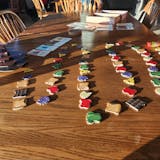Alles Käse!
Couldn't load pickup availability
Delivery and Shipping
Delivery and Shipping
For more details, please refer to our Shipping and Order Information.
Description
Description
| Designer | Meelis Looveer |
| Publisher | ABACUSSPIELE |
| Players | 2-6 |
| Playtime | 15 mins |
| Suggested Age | 6 and up |
| Honors | 2013 Kinderspielexperten "5-to-9-year-olds" Nominee |
| Additional Info | BoardGameGeek (Images, Videos, Reviews) |
Note: This is an import game in German. English Rules can be found here.
The player mice in Alles Käse want to collect as much hole-y cheese as possible, and to do so either they can play it safe, scout the territory, and see whether the cheese they find sticks around for later pilferage – or they can take a chance on a sweet-looking chunk of Swiss and possibly end up in a trap.
The cards in the deck have 1-6 "holes" on them, with six cards in each hole denomination; on the reverse side, the cards show either cheese or a trap, with the cards showing more holes having a greater percentage of traps.
To set up the game, players shuffle the 36 cards, then lay out six cards in a row with the hole side up. On a player's turn, he rolls the six-sided die. If the number on the die doesn't match the number of holes on any card in the row, the player peeks at one of these cards to see whether it shows cheese or a trap on the reverse side, then returns it to the row. (With 2-3 players, the player also moves the top card from the deck to the discard pile.) If the number on the die matches the number of holes on at least one card in the row, the player can either:
- Take one of these cards, reveal it, and place it in front of himself, or
- Take one of these cards and place it on the discard pile without revealing its opposite side to anyone.
In either case, the player then fills the empty spot in the row with the top card from the deck.
If someone collects a third trap, the game ends, this player automatically loses, and everyone else counts the number of holes on their cheese cards; trap cards are worth no points. The player with the most holes wins. The game also ends if the deck runs out, with the holiest player once again winning.





